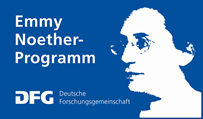I am since September 2015 an Emmy Noether research group leader for the project MuSyAD, financed by the Deutsche Foschungsgemeinschaft (DFG). I am based in the Institut für Mathematik in the Universität Potsdam.
Interests:
Anomaly detection, High or Infinite-Dimensional Statistical Inference, Inverse Problems and Compressed Sensing, Adaptive Estimation and Confidence Sets, Uncertainty quantification, Sequential Sampling, Bandit Theory, Optimisation of Computational Resources, Matrix Completion, Extreme Value Theory, Applications in Engineering, Neuroscience and Quantum Physics
The Emmy Noether Project : Anomaly Detection in a Multi-System Setting: Theoretical and Computational Objectives (MuSyAD)
Our project is on the topic of anomaly detection. Anomaly detection is an interdisciplinary domain, borrowing elements from mathematics, computer science, and engineering. The main aim is to develop efficient techniques for detecting anomalous behaviour of systems. In the classical scenario a monitor receives data from a system and compares this data to a reference system with some single normal behaviour. Ideally no strong assumptions are made on the nature of anomalous behaviours, so the problem of anomaly detection is by essence a non parametric problem. Here we propose to study a more complex scenario, which will be referred to as multi system anomaly detection. In this setting, reference systems can have a variety of normal behaviours, and moreover, there are many systems under the surveillance of the monitor, and the monitor must allocate its resources wisely among them. In this situation new theoretical and computational challenges arise. The overall objective of this proposal is to find efficient methods to solve the problem of multi system anomaly detection. This aim will be reached by addressing the following sub-objectives. First, we will generalise the theoretical framework of anomaly detection to the broader setting of multi-system anomaly detection. Second, multi-system anomaly detection methods will be developed, by taking ideas from the non parametric testing field and applying them to the new framework. Third, we will study optimal monitoring strategies for cases where the multiple systems cannot be monitored simultaneously. Here, it is important that the monitor allocates its resources among the systems in a way that is as efficient as possible. To this end, sequential and adaptive sampling methods that target the anomaly detection problem will be designed. Since anomaly detection is a non parametric problem, elements in the theory of non parametric confidence sets will be used. Finally, the newly developed methods will be applied to practical problems: a methodological example in extreme value theory, an econometric application for speculative bubble detection and two applications in a Brain Computer Interface framework.
The group:
Other members of the Emmy Noether group, also financed by the Emmy Noether grant MuSyAD and advised by me, are the two PhD candidates :Maurilio Gutzeit
Andrea Locatelli
and during sommer 2017, the intern (jointly supervised with Prof. Gilles Blanchard) :
Juliette Achdou

